Annotated Bibliography on Mental Health and Evidence-Based Psychological Care Treatment
VerifiedAdded on 2023/06/08
|9
|2367
|367
AI Summary
This annotated bibliography covers eight articles on mental health and evidence-based psychological care treatment. The articles cover topics such as depression and suicidality in gay men, cognitive-behavioral therapy, cultural diversity and mental health, and integrating mental health and social development. The bibliography provides insights into the best care practices for mental health and the challenges associated with providing effective care treatment.
Contribute Materials
Your contribution can guide someone’s learning journey. Share your
documents today.

Annotated Bibliography
Secure Best Marks with AI Grader
Need help grading? Try our AI Grader for instant feedback on your assignments.
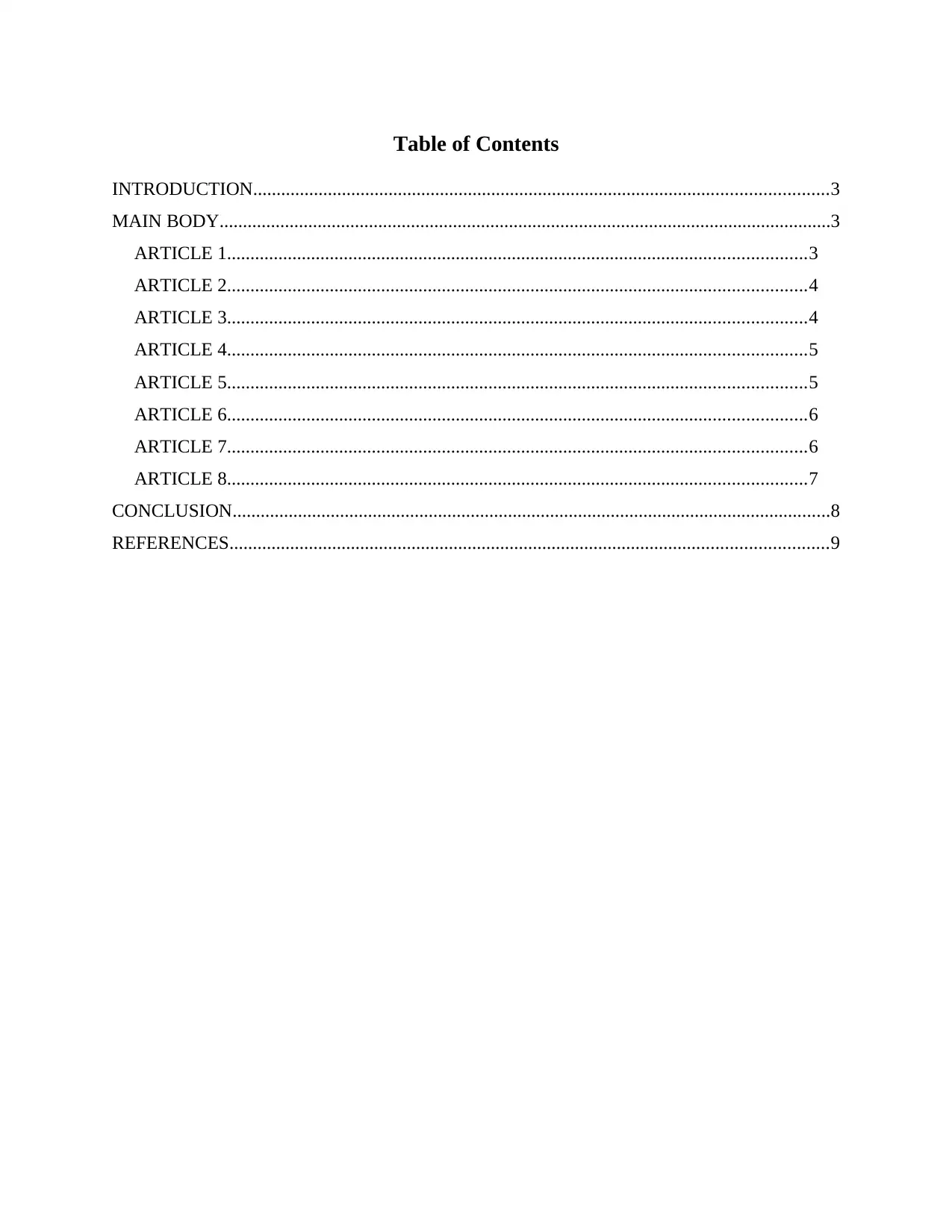
Table of Contents
INTRODUCTION...........................................................................................................................3
MAIN BODY...................................................................................................................................3
ARTICLE 1............................................................................................................................3
ARTICLE 2............................................................................................................................4
ARTICLE 3............................................................................................................................4
ARTICLE 4............................................................................................................................5
ARTICLE 5............................................................................................................................5
ARTICLE 6............................................................................................................................6
ARTICLE 7............................................................................................................................6
ARTICLE 8............................................................................................................................7
CONCLUSION................................................................................................................................8
REFERENCES................................................................................................................................9
INTRODUCTION...........................................................................................................................3
MAIN BODY...................................................................................................................................3
ARTICLE 1............................................................................................................................3
ARTICLE 2............................................................................................................................4
ARTICLE 3............................................................................................................................4
ARTICLE 4............................................................................................................................5
ARTICLE 5............................................................................................................................5
ARTICLE 6............................................................................................................................6
ARTICLE 7............................................................................................................................6
ARTICLE 8............................................................................................................................7
CONCLUSION................................................................................................................................8
REFERENCES................................................................................................................................9
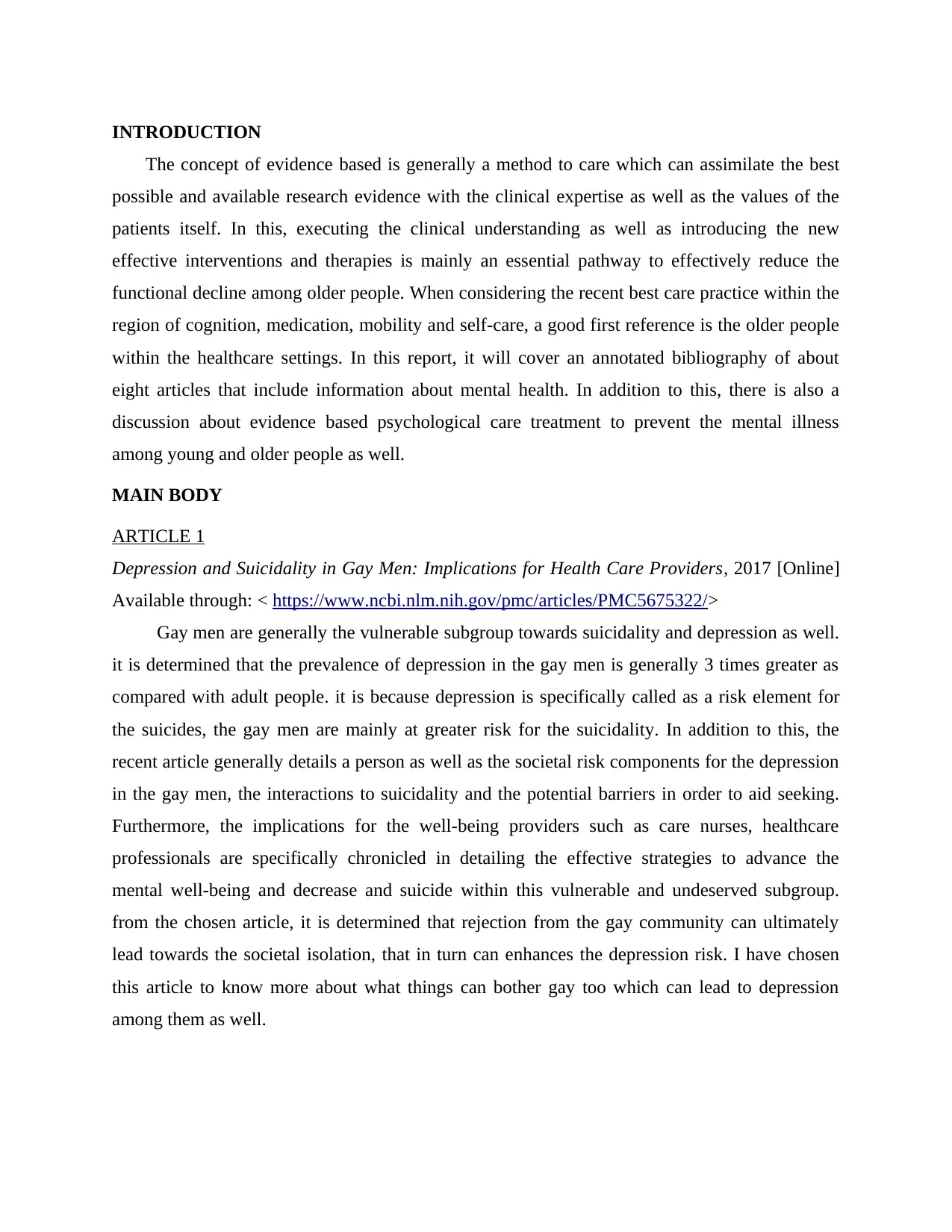
INTRODUCTION
The concept of evidence based is generally a method to care which can assimilate the best
possible and available research evidence with the clinical expertise as well as the values of the
patients itself. In this, executing the clinical understanding as well as introducing the new
effective interventions and therapies is mainly an essential pathway to effectively reduce the
functional decline among older people. When considering the recent best care practice within the
region of cognition, medication, mobility and self-care, a good first reference is the older people
within the healthcare settings. In this report, it will cover an annotated bibliography of about
eight articles that include information about mental health. In addition to this, there is also a
discussion about evidence based psychological care treatment to prevent the mental illness
among young and older people as well.
MAIN BODY
ARTICLE 1
Depression and Suicidality in Gay Men: Implications for Health Care Providers, 2017 [Online]
Available through: < https://www.ncbi.nlm.nih.gov/pmc/articles/PMC5675322/>
Gay men are generally the vulnerable subgroup towards suicidality and depression as well.
it is determined that the prevalence of depression in the gay men is generally 3 times greater as
compared with adult people. it is because depression is specifically called as a risk element for
the suicides, the gay men are mainly at greater risk for the suicidality. In addition to this, the
recent article generally details a person as well as the societal risk components for the depression
in the gay men, the interactions to suicidality and the potential barriers in order to aid seeking.
Furthermore, the implications for the well-being providers such as care nurses, healthcare
professionals are specifically chronicled in detailing the effective strategies to advance the
mental well-being and decrease and suicide within this vulnerable and undeserved subgroup.
from the chosen article, it is determined that rejection from the gay community can ultimately
lead towards the societal isolation, that in turn can enhances the depression risk. I have chosen
this article to know more about what things can bother gay too which can lead to depression
among them as well.
The concept of evidence based is generally a method to care which can assimilate the best
possible and available research evidence with the clinical expertise as well as the values of the
patients itself. In this, executing the clinical understanding as well as introducing the new
effective interventions and therapies is mainly an essential pathway to effectively reduce the
functional decline among older people. When considering the recent best care practice within the
region of cognition, medication, mobility and self-care, a good first reference is the older people
within the healthcare settings. In this report, it will cover an annotated bibliography of about
eight articles that include information about mental health. In addition to this, there is also a
discussion about evidence based psychological care treatment to prevent the mental illness
among young and older people as well.
MAIN BODY
ARTICLE 1
Depression and Suicidality in Gay Men: Implications for Health Care Providers, 2017 [Online]
Available through: < https://www.ncbi.nlm.nih.gov/pmc/articles/PMC5675322/>
Gay men are generally the vulnerable subgroup towards suicidality and depression as well.
it is determined that the prevalence of depression in the gay men is generally 3 times greater as
compared with adult people. it is because depression is specifically called as a risk element for
the suicides, the gay men are mainly at greater risk for the suicidality. In addition to this, the
recent article generally details a person as well as the societal risk components for the depression
in the gay men, the interactions to suicidality and the potential barriers in order to aid seeking.
Furthermore, the implications for the well-being providers such as care nurses, healthcare
professionals are specifically chronicled in detailing the effective strategies to advance the
mental well-being and decrease and suicide within this vulnerable and undeserved subgroup.
from the chosen article, it is determined that rejection from the gay community can ultimately
lead towards the societal isolation, that in turn can enhances the depression risk. I have chosen
this article to know more about what things can bother gay too which can lead to depression
among them as well.
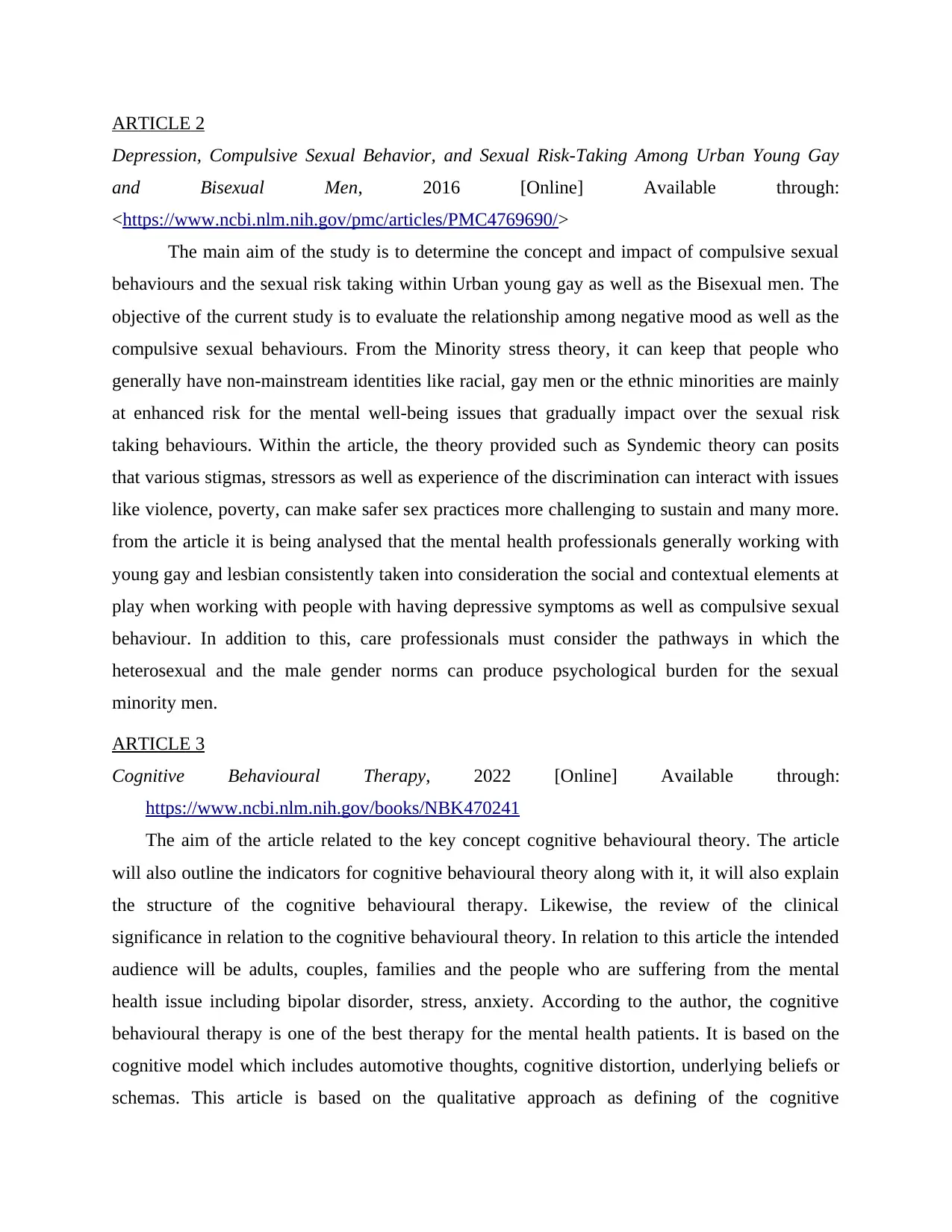
ARTICLE 2
Depression, Compulsive Sexual Behavior, and Sexual Risk-Taking Among Urban Young Gay
and Bisexual Men, 2016 [Online] Available through:
<https://www.ncbi.nlm.nih.gov/pmc/articles/PMC4769690/>
The main aim of the study is to determine the concept and impact of compulsive sexual
behaviours and the sexual risk taking within Urban young gay as well as the Bisexual men. The
objective of the current study is to evaluate the relationship among negative mood as well as the
compulsive sexual behaviours. From the Minority stress theory, it can keep that people who
generally have non-mainstream identities like racial, gay men or the ethnic minorities are mainly
at enhanced risk for the mental well-being issues that gradually impact over the sexual risk
taking behaviours. Within the article, the theory provided such as Syndemic theory can posits
that various stigmas, stressors as well as experience of the discrimination can interact with issues
like violence, poverty, can make safer sex practices more challenging to sustain and many more.
from the article it is being analysed that the mental health professionals generally working with
young gay and lesbian consistently taken into consideration the social and contextual elements at
play when working with people with having depressive symptoms as well as compulsive sexual
behaviour. In addition to this, care professionals must consider the pathways in which the
heterosexual and the male gender norms can produce psychological burden for the sexual
minority men.
ARTICLE 3
Cognitive Behavioural Therapy, 2022 [Online] Available through:
https://www.ncbi.nlm.nih.gov/books/NBK470241
The aim of the article related to the key concept cognitive behavioural theory. The article
will also outline the indicators for cognitive behavioural theory along with it, it will also explain
the structure of the cognitive behavioural therapy. Likewise, the review of the clinical
significance in relation to the cognitive behavioural theory. In relation to this article the intended
audience will be adults, couples, families and the people who are suffering from the mental
health issue including bipolar disorder, stress, anxiety. According to the author, the cognitive
behavioural therapy is one of the best therapy for the mental health patients. It is based on the
cognitive model which includes automotive thoughts, cognitive distortion, underlying beliefs or
schemas. This article is based on the qualitative approach as defining of the cognitive
Depression, Compulsive Sexual Behavior, and Sexual Risk-Taking Among Urban Young Gay
and Bisexual Men, 2016 [Online] Available through:
<https://www.ncbi.nlm.nih.gov/pmc/articles/PMC4769690/>
The main aim of the study is to determine the concept and impact of compulsive sexual
behaviours and the sexual risk taking within Urban young gay as well as the Bisexual men. The
objective of the current study is to evaluate the relationship among negative mood as well as the
compulsive sexual behaviours. From the Minority stress theory, it can keep that people who
generally have non-mainstream identities like racial, gay men or the ethnic minorities are mainly
at enhanced risk for the mental well-being issues that gradually impact over the sexual risk
taking behaviours. Within the article, the theory provided such as Syndemic theory can posits
that various stigmas, stressors as well as experience of the discrimination can interact with issues
like violence, poverty, can make safer sex practices more challenging to sustain and many more.
from the article it is being analysed that the mental health professionals generally working with
young gay and lesbian consistently taken into consideration the social and contextual elements at
play when working with people with having depressive symptoms as well as compulsive sexual
behaviour. In addition to this, care professionals must consider the pathways in which the
heterosexual and the male gender norms can produce psychological burden for the sexual
minority men.
ARTICLE 3
Cognitive Behavioural Therapy, 2022 [Online] Available through:
https://www.ncbi.nlm.nih.gov/books/NBK470241
The aim of the article related to the key concept cognitive behavioural theory. The article
will also outline the indicators for cognitive behavioural theory along with it, it will also explain
the structure of the cognitive behavioural therapy. Likewise, the review of the clinical
significance in relation to the cognitive behavioural theory. In relation to this article the intended
audience will be adults, couples, families and the people who are suffering from the mental
health issue including bipolar disorder, stress, anxiety. According to the author, the cognitive
behavioural therapy is one of the best therapy for the mental health patients. It is based on the
cognitive model which includes automotive thoughts, cognitive distortion, underlying beliefs or
schemas. This article is based on the qualitative approach as defining of the cognitive
Secure Best Marks with AI Grader
Need help grading? Try our AI Grader for instant feedback on your assignments.
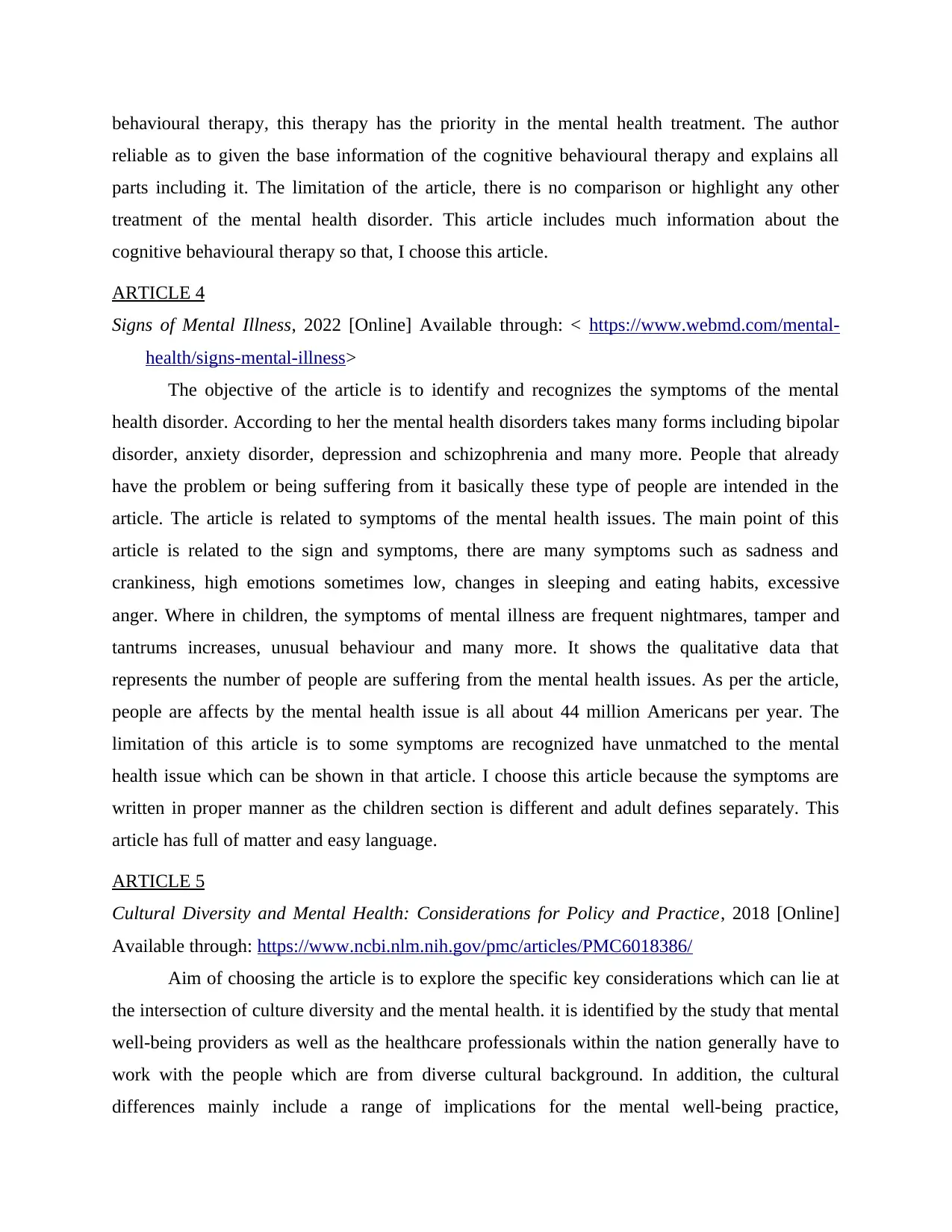
behavioural therapy, this therapy has the priority in the mental health treatment. The author
reliable as to given the base information of the cognitive behavioural therapy and explains all
parts including it. The limitation of the article, there is no comparison or highlight any other
treatment of the mental health disorder. This article includes much information about the
cognitive behavioural therapy so that, I choose this article.
ARTICLE 4
Signs of Mental Illness, 2022 [Online] Available through: < https://www.webmd.com/mental-
health/signs-mental-illness>
The objective of the article is to identify and recognizes the symptoms of the mental
health disorder. According to her the mental health disorders takes many forms including bipolar
disorder, anxiety disorder, depression and schizophrenia and many more. People that already
have the problem or being suffering from it basically these type of people are intended in the
article. The article is related to symptoms of the mental health issues. The main point of this
article is related to the sign and symptoms, there are many symptoms such as sadness and
crankiness, high emotions sometimes low, changes in sleeping and eating habits, excessive
anger. Where in children, the symptoms of mental illness are frequent nightmares, tamper and
tantrums increases, unusual behaviour and many more. It shows the qualitative data that
represents the number of people are suffering from the mental health issues. As per the article,
people are affects by the mental health issue is all about 44 million Americans per year. The
limitation of this article is to some symptoms are recognized have unmatched to the mental
health issue which can be shown in that article. I choose this article because the symptoms are
written in proper manner as the children section is different and adult defines separately. This
article has full of matter and easy language.
ARTICLE 5
Cultural Diversity and Mental Health: Considerations for Policy and Practice, 2018 [Online]
Available through: https://www.ncbi.nlm.nih.gov/pmc/articles/PMC6018386/
Aim of choosing the article is to explore the specific key considerations which can lie at
the intersection of culture diversity and the mental health. it is identified by the study that mental
well-being providers as well as the healthcare professionals within the nation generally have to
work with the people which are from diverse cultural background. In addition, the cultural
differences mainly include a range of implications for the mental well-being practice,
reliable as to given the base information of the cognitive behavioural therapy and explains all
parts including it. The limitation of the article, there is no comparison or highlight any other
treatment of the mental health disorder. This article includes much information about the
cognitive behavioural therapy so that, I choose this article.
ARTICLE 4
Signs of Mental Illness, 2022 [Online] Available through: < https://www.webmd.com/mental-
health/signs-mental-illness>
The objective of the article is to identify and recognizes the symptoms of the mental
health disorder. According to her the mental health disorders takes many forms including bipolar
disorder, anxiety disorder, depression and schizophrenia and many more. People that already
have the problem or being suffering from it basically these type of people are intended in the
article. The article is related to symptoms of the mental health issues. The main point of this
article is related to the sign and symptoms, there are many symptoms such as sadness and
crankiness, high emotions sometimes low, changes in sleeping and eating habits, excessive
anger. Where in children, the symptoms of mental illness are frequent nightmares, tamper and
tantrums increases, unusual behaviour and many more. It shows the qualitative data that
represents the number of people are suffering from the mental health issues. As per the article,
people are affects by the mental health issue is all about 44 million Americans per year. The
limitation of this article is to some symptoms are recognized have unmatched to the mental
health issue which can be shown in that article. I choose this article because the symptoms are
written in proper manner as the children section is different and adult defines separately. This
article has full of matter and easy language.
ARTICLE 5
Cultural Diversity and Mental Health: Considerations for Policy and Practice, 2018 [Online]
Available through: https://www.ncbi.nlm.nih.gov/pmc/articles/PMC6018386/
Aim of choosing the article is to explore the specific key considerations which can lie at
the intersection of culture diversity and the mental health. it is identified by the study that mental
well-being providers as well as the healthcare professionals within the nation generally have to
work with the people which are from diverse cultural background. In addition, the cultural
differences mainly include a range of implications for the mental well-being practice,
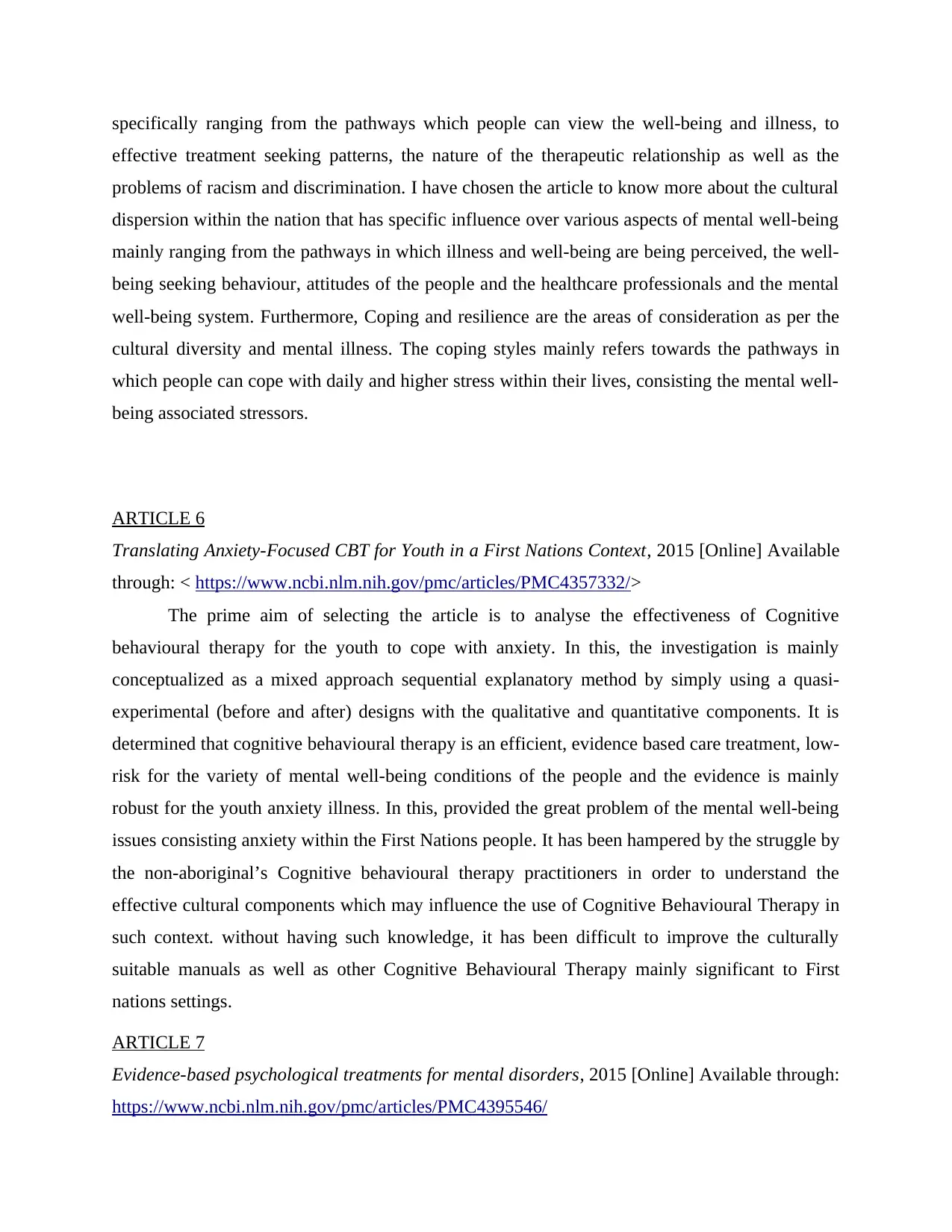
specifically ranging from the pathways which people can view the well-being and illness, to
effective treatment seeking patterns, the nature of the therapeutic relationship as well as the
problems of racism and discrimination. I have chosen the article to know more about the cultural
dispersion within the nation that has specific influence over various aspects of mental well-being
mainly ranging from the pathways in which illness and well-being are being perceived, the well-
being seeking behaviour, attitudes of the people and the healthcare professionals and the mental
well-being system. Furthermore, Coping and resilience are the areas of consideration as per the
cultural diversity and mental illness. The coping styles mainly refers towards the pathways in
which people can cope with daily and higher stress within their lives, consisting the mental well-
being associated stressors.
ARTICLE 6
Translating Anxiety-Focused CBT for Youth in a First Nations Context, 2015 [Online] Available
through: < https://www.ncbi.nlm.nih.gov/pmc/articles/PMC4357332/>
The prime aim of selecting the article is to analyse the effectiveness of Cognitive
behavioural therapy for the youth to cope with anxiety. In this, the investigation is mainly
conceptualized as a mixed approach sequential explanatory method by simply using a quasi-
experimental (before and after) designs with the qualitative and quantitative components. It is
determined that cognitive behavioural therapy is an efficient, evidence based care treatment, low-
risk for the variety of mental well-being conditions of the people and the evidence is mainly
robust for the youth anxiety illness. In this, provided the great problem of the mental well-being
issues consisting anxiety within the First Nations people. It has been hampered by the struggle by
the non-aboriginal’s Cognitive behavioural therapy practitioners in order to understand the
effective cultural components which may influence the use of Cognitive Behavioural Therapy in
such context. without having such knowledge, it has been difficult to improve the culturally
suitable manuals as well as other Cognitive Behavioural Therapy mainly significant to First
nations settings.
ARTICLE 7
Evidence-based psychological treatments for mental disorders, 2015 [Online] Available through:
https://www.ncbi.nlm.nih.gov/pmc/articles/PMC4395546/
effective treatment seeking patterns, the nature of the therapeutic relationship as well as the
problems of racism and discrimination. I have chosen the article to know more about the cultural
dispersion within the nation that has specific influence over various aspects of mental well-being
mainly ranging from the pathways in which illness and well-being are being perceived, the well-
being seeking behaviour, attitudes of the people and the healthcare professionals and the mental
well-being system. Furthermore, Coping and resilience are the areas of consideration as per the
cultural diversity and mental illness. The coping styles mainly refers towards the pathways in
which people can cope with daily and higher stress within their lives, consisting the mental well-
being associated stressors.
ARTICLE 6
Translating Anxiety-Focused CBT for Youth in a First Nations Context, 2015 [Online] Available
through: < https://www.ncbi.nlm.nih.gov/pmc/articles/PMC4357332/>
The prime aim of selecting the article is to analyse the effectiveness of Cognitive
behavioural therapy for the youth to cope with anxiety. In this, the investigation is mainly
conceptualized as a mixed approach sequential explanatory method by simply using a quasi-
experimental (before and after) designs with the qualitative and quantitative components. It is
determined that cognitive behavioural therapy is an efficient, evidence based care treatment, low-
risk for the variety of mental well-being conditions of the people and the evidence is mainly
robust for the youth anxiety illness. In this, provided the great problem of the mental well-being
issues consisting anxiety within the First Nations people. It has been hampered by the struggle by
the non-aboriginal’s Cognitive behavioural therapy practitioners in order to understand the
effective cultural components which may influence the use of Cognitive Behavioural Therapy in
such context. without having such knowledge, it has been difficult to improve the culturally
suitable manuals as well as other Cognitive Behavioural Therapy mainly significant to First
nations settings.
ARTICLE 7
Evidence-based psychological treatments for mental disorders, 2015 [Online] Available through:
https://www.ncbi.nlm.nih.gov/pmc/articles/PMC4395546/
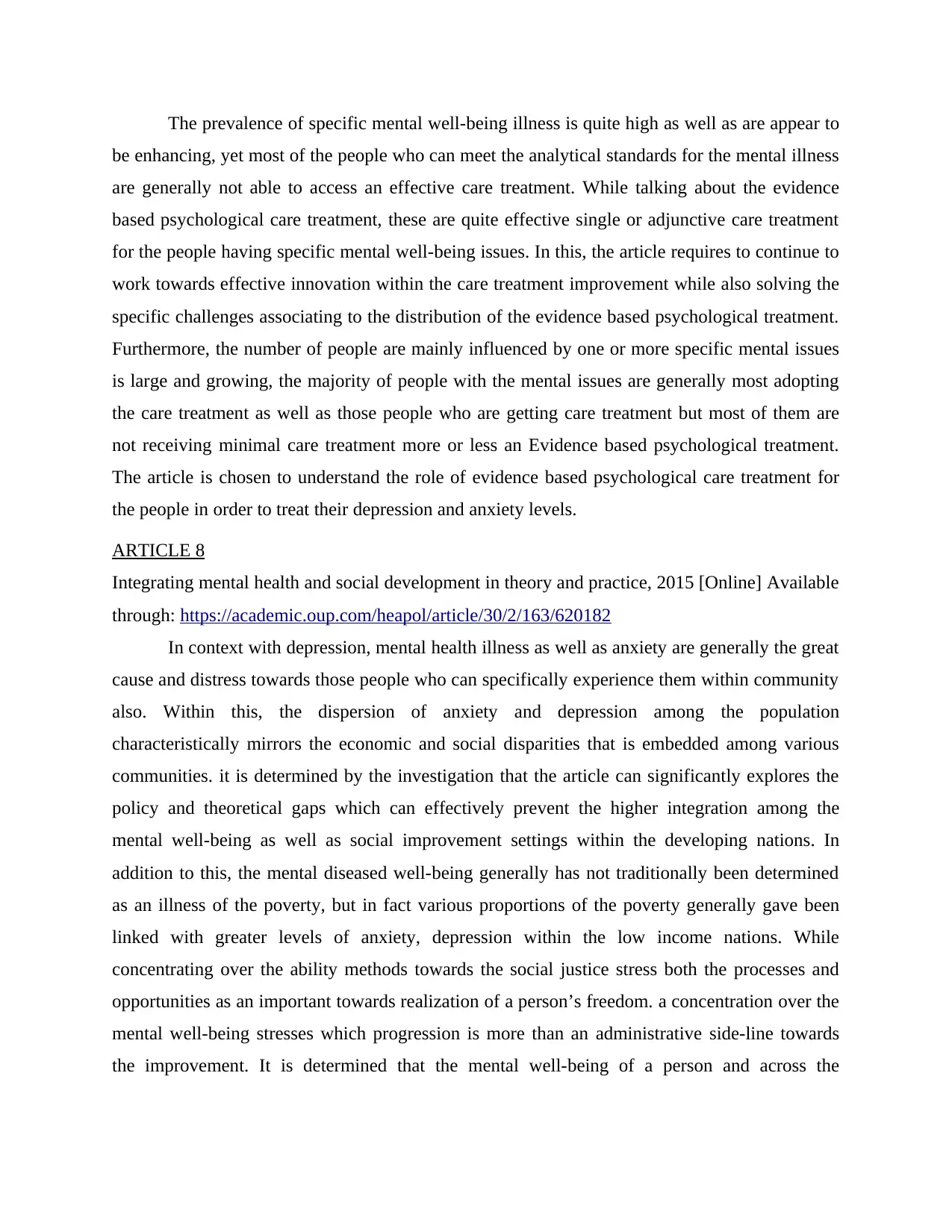
The prevalence of specific mental well-being illness is quite high as well as are appear to
be enhancing, yet most of the people who can meet the analytical standards for the mental illness
are generally not able to access an effective care treatment. While talking about the evidence
based psychological care treatment, these are quite effective single or adjunctive care treatment
for the people having specific mental well-being issues. In this, the article requires to continue to
work towards effective innovation within the care treatment improvement while also solving the
specific challenges associating to the distribution of the evidence based psychological treatment.
Furthermore, the number of people are mainly influenced by one or more specific mental issues
is large and growing, the majority of people with the mental issues are generally most adopting
the care treatment as well as those people who are getting care treatment but most of them are
not receiving minimal care treatment more or less an Evidence based psychological treatment.
The article is chosen to understand the role of evidence based psychological care treatment for
the people in order to treat their depression and anxiety levels.
ARTICLE 8
Integrating mental health and social development in theory and practice, 2015 [Online] Available
through: https://academic.oup.com/heapol/article/30/2/163/620182
In context with depression, mental health illness as well as anxiety are generally the great
cause and distress towards those people who can specifically experience them within community
also. Within this, the dispersion of anxiety and depression among the population
characteristically mirrors the economic and social disparities that is embedded among various
communities. it is determined by the investigation that the article can significantly explores the
policy and theoretical gaps which can effectively prevent the higher integration among the
mental well-being as well as social improvement settings within the developing nations. In
addition to this, the mental diseased well-being generally has not traditionally been determined
as an illness of the poverty, but in fact various proportions of the poverty generally gave been
linked with greater levels of anxiety, depression within the low income nations. While
concentrating over the ability methods towards the social justice stress both the processes and
opportunities as an important towards realization of a person’s freedom. a concentration over the
mental well-being stresses which progression is more than an administrative side-line towards
the improvement. It is determined that the mental well-being of a person and across the
be enhancing, yet most of the people who can meet the analytical standards for the mental illness
are generally not able to access an effective care treatment. While talking about the evidence
based psychological care treatment, these are quite effective single or adjunctive care treatment
for the people having specific mental well-being issues. In this, the article requires to continue to
work towards effective innovation within the care treatment improvement while also solving the
specific challenges associating to the distribution of the evidence based psychological treatment.
Furthermore, the number of people are mainly influenced by one or more specific mental issues
is large and growing, the majority of people with the mental issues are generally most adopting
the care treatment as well as those people who are getting care treatment but most of them are
not receiving minimal care treatment more or less an Evidence based psychological treatment.
The article is chosen to understand the role of evidence based psychological care treatment for
the people in order to treat their depression and anxiety levels.
ARTICLE 8
Integrating mental health and social development in theory and practice, 2015 [Online] Available
through: https://academic.oup.com/heapol/article/30/2/163/620182
In context with depression, mental health illness as well as anxiety are generally the great
cause and distress towards those people who can specifically experience them within community
also. Within this, the dispersion of anxiety and depression among the population
characteristically mirrors the economic and social disparities that is embedded among various
communities. it is determined by the investigation that the article can significantly explores the
policy and theoretical gaps which can effectively prevent the higher integration among the
mental well-being as well as social improvement settings within the developing nations. In
addition to this, the mental diseased well-being generally has not traditionally been determined
as an illness of the poverty, but in fact various proportions of the poverty generally gave been
linked with greater levels of anxiety, depression within the low income nations. While
concentrating over the ability methods towards the social justice stress both the processes and
opportunities as an important towards realization of a person’s freedom. a concentration over the
mental well-being stresses which progression is more than an administrative side-line towards
the improvement. It is determined that the mental well-being of a person and across the
Paraphrase This Document
Need a fresh take? Get an instant paraphrase of this document with our AI Paraphraser
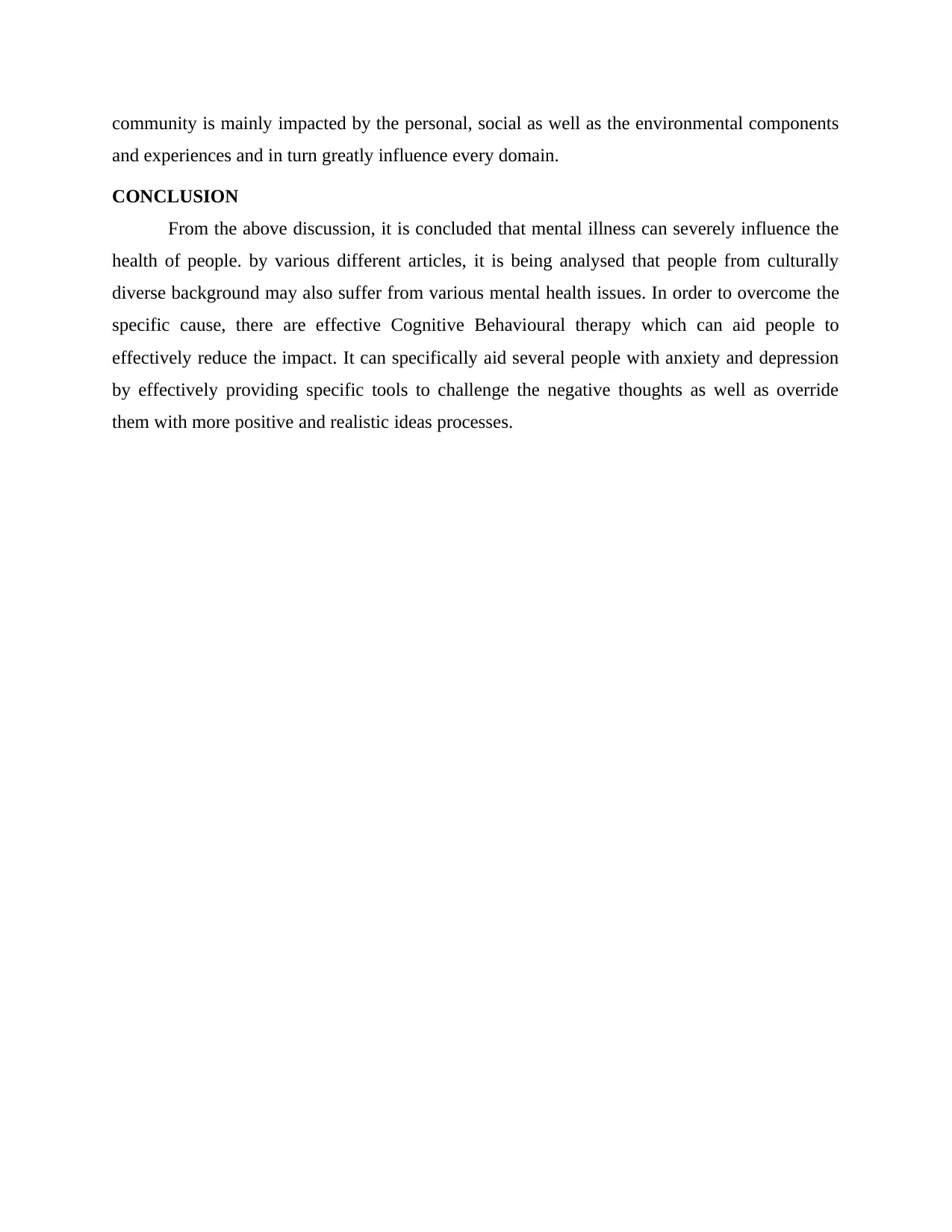
community is mainly impacted by the personal, social as well as the environmental components
and experiences and in turn greatly influence every domain.
CONCLUSION
From the above discussion, it is concluded that mental illness can severely influence the
health of people. by various different articles, it is being analysed that people from culturally
diverse background may also suffer from various mental health issues. In order to overcome the
specific cause, there are effective Cognitive Behavioural therapy which can aid people to
effectively reduce the impact. It can specifically aid several people with anxiety and depression
by effectively providing specific tools to challenge the negative thoughts as well as override
them with more positive and realistic ideas processes.
and experiences and in turn greatly influence every domain.
CONCLUSION
From the above discussion, it is concluded that mental illness can severely influence the
health of people. by various different articles, it is being analysed that people from culturally
diverse background may also suffer from various mental health issues. In order to overcome the
specific cause, there are effective Cognitive Behavioural therapy which can aid people to
effectively reduce the impact. It can specifically aid several people with anxiety and depression
by effectively providing specific tools to challenge the negative thoughts as well as override
them with more positive and realistic ideas processes.
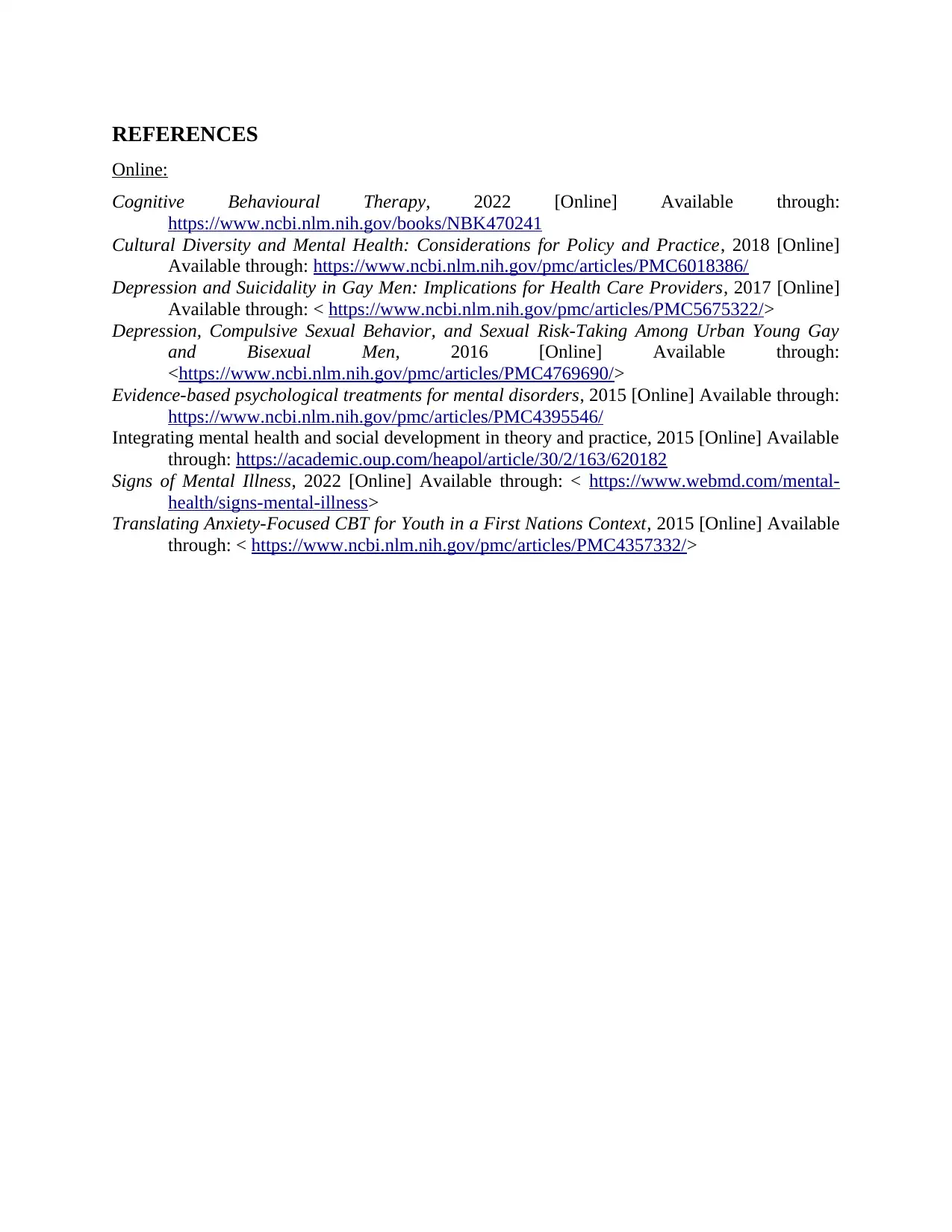
REFERENCES
Online:
Cognitive Behavioural Therapy, 2022 [Online] Available through:
https://www.ncbi.nlm.nih.gov/books/NBK470241
Cultural Diversity and Mental Health: Considerations for Policy and Practice, 2018 [Online]
Available through: https://www.ncbi.nlm.nih.gov/pmc/articles/PMC6018386/
Depression and Suicidality in Gay Men: Implications for Health Care Providers, 2017 [Online]
Available through: < https://www.ncbi.nlm.nih.gov/pmc/articles/PMC5675322/>
Depression, Compulsive Sexual Behavior, and Sexual Risk-Taking Among Urban Young Gay
and Bisexual Men, 2016 [Online] Available through:
<https://www.ncbi.nlm.nih.gov/pmc/articles/PMC4769690/>
Evidence-based psychological treatments for mental disorders, 2015 [Online] Available through:
https://www.ncbi.nlm.nih.gov/pmc/articles/PMC4395546/
Integrating mental health and social development in theory and practice, 2015 [Online] Available
through: https://academic.oup.com/heapol/article/30/2/163/620182
Signs of Mental Illness, 2022 [Online] Available through: < https://www.webmd.com/mental-
health/signs-mental-illness>
Translating Anxiety-Focused CBT for Youth in a First Nations Context, 2015 [Online] Available
through: < https://www.ncbi.nlm.nih.gov/pmc/articles/PMC4357332/>
Online:
Cognitive Behavioural Therapy, 2022 [Online] Available through:
https://www.ncbi.nlm.nih.gov/books/NBK470241
Cultural Diversity and Mental Health: Considerations for Policy and Practice, 2018 [Online]
Available through: https://www.ncbi.nlm.nih.gov/pmc/articles/PMC6018386/
Depression and Suicidality in Gay Men: Implications for Health Care Providers, 2017 [Online]
Available through: < https://www.ncbi.nlm.nih.gov/pmc/articles/PMC5675322/>
Depression, Compulsive Sexual Behavior, and Sexual Risk-Taking Among Urban Young Gay
and Bisexual Men, 2016 [Online] Available through:
<https://www.ncbi.nlm.nih.gov/pmc/articles/PMC4769690/>
Evidence-based psychological treatments for mental disorders, 2015 [Online] Available through:
https://www.ncbi.nlm.nih.gov/pmc/articles/PMC4395546/
Integrating mental health and social development in theory and practice, 2015 [Online] Available
through: https://academic.oup.com/heapol/article/30/2/163/620182
Signs of Mental Illness, 2022 [Online] Available through: < https://www.webmd.com/mental-
health/signs-mental-illness>
Translating Anxiety-Focused CBT for Youth in a First Nations Context, 2015 [Online] Available
through: < https://www.ncbi.nlm.nih.gov/pmc/articles/PMC4357332/>
1 out of 9
Related Documents
Your All-in-One AI-Powered Toolkit for Academic Success.
+13062052269
info@desklib.com
Available 24*7 on WhatsApp / Email
![[object Object]](/_next/static/media/star-bottom.7253800d.svg)
Unlock your academic potential
© 2024 | Zucol Services PVT LTD | All rights reserved.





